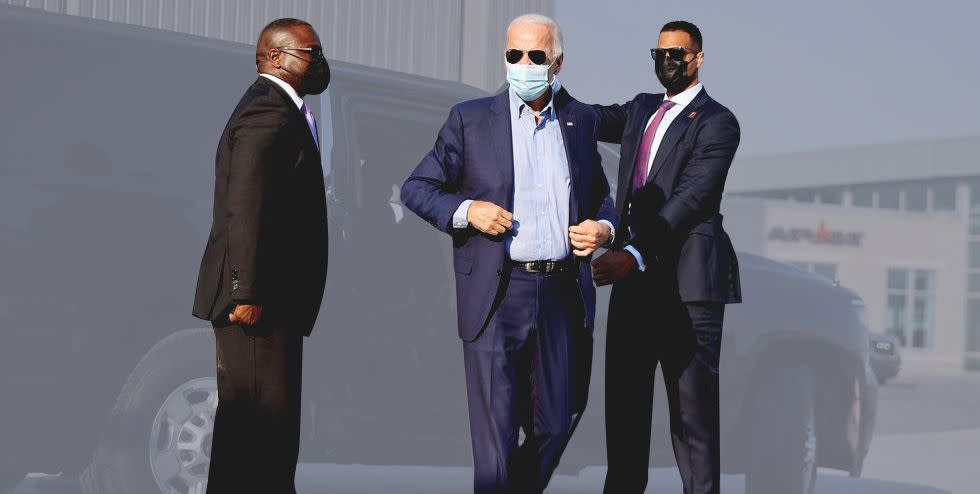God Help Us If Joe Biden's Platform Turns Out to Be All Talk

It's Joe Biden's bet that the electorate has tired of the perpetual chaos of the current presidency, and that they will respond primarily to his calls for a Return to the Decent and the Normal. This could be a good wager, particularly because the incumbent is running on the inexplicable notion that only he can put a stop to the chaos and dysfunction he's overseen throughout his first term. This is a dumb proposition, and no one suggests the president will win an actual majority of American citizens' votes in November. Instead, we've all accepted he could slither into a second term only because the Electoral College is outrageously skewed towards rural Republican representation.
Biden is also running on a fairly progressive policy platform, though it's not the focus of most of his messaging. Still, there have been some things for lefties to latch onto, like the Democratic nominee's thorough embrace of a minimum-wage hike and a menu of economic policy prescriptions—from trillions in green energy spending to combat the climate crisis and foster environmental justice to "a new social and economic contract" that proclaims healthcare and housing are rights—agreed to by joint committees forged with Bernie Sanders' camp. Which is why a story from Annie Linskey in the Washington Post landed like an anvil on Tuesday.
When Joe Biden released economic recommendations two months ago, they included a few ideas that worried some powerful bankers: allowing banking at the post office, for example, and having the Federal Reserve guarantee all Americans a bank account.
But in private calls with Wall Street leaders, the Biden campaign made it clear those proposals would not be central to Biden’s agenda.
“They basically said, ‘Listen, this is just an exercise to keep the Warren people happy, and don’t read too much into it,’ ” said one investment banker, referring to liberal supporters of Sen. Elizabeth Warren (D-Mass.). The banker, who spoke on the condition of anonymity to describe private talks, said that message was conveyed on multiple calls.
The idea that taking on the hegemony of Wall Street and Big Business in the American economy is some all-talk red meat you throw to progressives is pretty horrifying. (In the WaPo piece, some Bidenites attempted to distinguish between the candidate's official platform and the "recommendations" of the Biden-Sanders working groups. This is not reassuring.) This is like when Biden's transition-team chief, former Senator Ted Kaufman, suggested that, should the Democrat win, there won't be "a big increase in federal spending" during a pandemic and accompanying recession "because I think basically when we get in, the pantry is going to be bare." This was, sadly, some anachronistic handwringing about The National Debt. "We’re going to have limited funds to do what we’re going to do," Kaufman added, thereby firing the starting gun for all the next-generation Trumpists for 2024.

If Democrats do not address the economic cataclysm currently in progress during their first two years in (theoretical) control, they are signing their own death warrants in the midterms, and possibly the presidential two years later. For all the shrill fear-mongering about Barack Obama's socialism, he was in reality a center-left Clintonist liberal with far too much concern about The Deficit. The stimulus bill he signed amid the Great Recession should have been bigger, and if Biden makes a similar mistake, it could be the beginning of the end for the American republic. For all that policymakers and economists try to make this complicated, it's basic Keynesian economics: in recession times, the government should step in to grease the gears of a stalled economy. Biden even has the gall to, at times, talk himself up as an FDR figure in the making. Better deliver on that green infrastructure plan, then. He doesn't need to call it the Green New Deal, but we do need to do something—anything—about the climate crisis, and it doubles as an opportunity to create good-paying jobs.
More than all that, it represents the chance to reassert the role of government in shaping the economy. This is the obligation of the left party in our system, one which the Democratic Party has often abdicated since the Reagan era. It doesn't just mean government spending, it also means dusting off the antitrust law already on the books to take on the monopoly power that is distorting markets and, in an unholy alliance with corporate power and conservative economics, exacerbating the deep inequality that is fueling so much of our national dysfunction. It also seems like good politics if you're actually interested in winning back those voters who perhaps reluctantly voted for Donald Trump four years ago on the basis he was the "change" candidate who could break the stranglehold of monied interests on the federal government. The question, really, is whether Democrats any longer want to be the party of TurboTax.
Biden may well win without convincing much of anyone he will be a trust-buster or a climate warrior. His opponent can scarcely articulate any second-term agenda at all beyond everything will be great again, and he also happens to be a racist lunatic. But if another Democratic president turns in another four years of Big Business coziness, allowing monopoly to flourish and the financial-services industry to continue making such a big chunk of the rules for the American economy, the public way well hire another right-wing authoritarian in the mistaken belief they will do the job.
You Might Also Like
